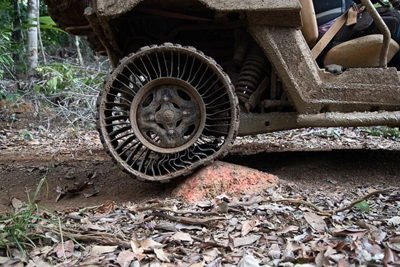Global airless tires market is expected to grow at a 5.4 percent CAGR
Pune, India – The global airless tires market is expected to grow at a 5.4% CAGR and reach a value of US$ 85 million by 2033, up from US$ 50 million in 2023 according to Fact.MR.
The airless tire, often known as a flat-free tire or non-pneumatic tire (NPT), doesn’t rely on air pressure for support, eliminating the need for regular tire inflation. Constructed from rubber, it serves as a flexible cushion that absorbs vibrations and dampens the shocks experienced by the vehicle.
The dynamics of the airless tires market are propelled by a confluence of factors, including advancements in tire technology, environmental concerns, and the ever-evolving automotive landscape. Airless tires offer several advantages over their pneumatic counterparts, such as enhanced durability, reduced maintenance, and the ability to withstand rough terrain.
Furthermore, the market dynamics are influenced by the growing focus on sustainability and the reduction of carbon emissions in the transportation sector. As governments worldwide implement stringent regulations on vehicle emissions, the adoption of airless tires becomes a strategic choice for automakers to meet these environmental goals.
The airless tires market presents a spectrum of opportunities for industry players. From off-road enthusiasts seeking a hassle-free tire solution to commercial vehicle operators looking to minimize downtime, the appeal of airless tires is expanding. Additionally, the development of airless tires for electric vehicles (EVs) and autonomous vehicles (AVs) opens new avenues for growth.
Moreover, the market offers opportunities for innovation, with companies exploring novel materials and designs to optimize the performance of airless tires. As urbanization continues and smart city initiatives gain traction, the demand for airless tires equipped with IoT sensors for real-time monitoring and maintenance is poised to surge.
Airless tires, despite their pneumatic appearance, are constructed from solid polyurethane with a distinctive saw-toothed tread. They deliver the same bounce and load-bearing capabilities as air-filled tires but eliminate the need for frequent inflation maintenance. Unlike foam-filled alternatives, the solid rubber composition of airless tires provides a quiet, smooth roll with added shock absorption. These tires can traverse obstacles like glass, nails, and stones without deflating, as they lack tubes. Furthermore, their chemical and heat resistance surpasses that of pneumatic tires, ensuring durability. Airless tires excel in noise reduction, rollability, and floor protection compared to their counterparts.
North America is witnessing substantial expansion in the global market, primarily attributed to the increasing adoption of airless tires in various applications such as off-road, utility, and military vehicles. Market players are also maintaining a strong focus on supplying products for military and defense purposes.
Resilient Technologies and Michelin are notable providers of these airless tires to the United States military, facilitating mobility in challenging and uneven terrains. U.S. manufacturing companies are dedicating their efforts to developing advanced airless tire technologies aimed at enhancing the performance of heavy-duty vehicles. Additionally, governmental and non-governmental organizations within the country are actively promoting the use of fuel-efficient automotive components to mitigate automotive emissions.
Key players in the airless tires market employ various strategies to bolster their market share and presence. These tactics encompass collaborations, technological innovations, acquisitions, investments, and active engagement in research and development. Notably, startups are also making strides in developing innovative airless tire solutions.
One such startup, SMART, in collaboration with NASA as part of the Star-tup Program, introduced an airless bicycle tire designed by NASA researchers, enhancing durability for lunar and Martian rovers.
The Goodyear Tire and Rubber Company initiated tests of airless tires on delivery robots at Bowling Green State University, Ohio, in January 2022.
In October 2021, Michelin introduced The Uptis airless tires, made from fiberglass and rubber, boasting fuel efficiency, longevity, and recyclability.
Toyo Tires commenced commercializing airless tires, devoid of the need for air filling, in April 2021, primarily targeting small mobile applications like golf carts with production facilities established at the Sendai Plant.

